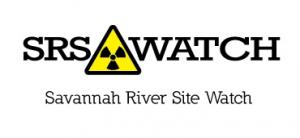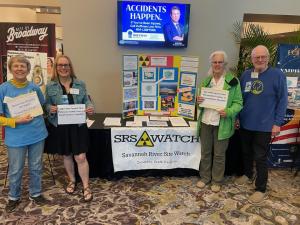
Savannah River Site Watch (SRS Watch), proudly celebrating 10-years of public-advocacy work, opposes the proposed SRS Plutonium Bomb Plant – for environmental, national security and cost reasons. Pit-production construction at SRS is estimated to cost up to $25 billion.

SRS Watch supporters, with director Tom Clements on the far right, at an information table at a Bonnie Raitt concert in N. Charleston, SC on May 9, 2024. We love Bonnie and the Guacamole Fund and greatly appreciate their support!

SRS Watch director Clements volunteers at a homeless shelter in Columbia, SC, where he’s known as “Bag Man” as he’s given clients over 1200 roller bags and backpacks since 2016. A big thanks to Atom Girl for her design and production of the cool stickers! Bag Man Rolls!
SRS Watch Papers and Memorabilia of a Successful Decade of Work and those of Director Tom Clements since the 1970s Archived at University of Georgia in Athens
— Tom Clements, Director, SRS Watch
COLUMBIA, SC, UNITED STATES, November 4, 2024 /EINPresswire.com/ — The public interest group Savannah River Site Watch is proud to celebrate 10 years of non-profit advocacy for sound policies in South Carolina, the United States and worldwide concerning nuclear nonproliferation, nuclear weapons, nuclear power and nuclear waste.
Founded in 2014 in Columbia, South Carolina, SRS Watch has been on the front line on nuclear issues as presented by the U.S. Department of Energy and other agencies. A main focus of the non-profit group remains the DOE’s Savannah River Site (SRS) nuclear weapons facility near Aiken, SC.
The director of SRS Watch, Tom Clements, has over 40 years of non-profit, public interest work and the victories that he and SRS Watch and other groups with which they have been affiliated are many.
“I couldn’t be more proud of what SRS Watch has accomplished over the past decade, due to support by our loyal funders, especially our work in support of sound nuclear non-proliferation policies,” said Clements. “We have been a leader in the U.S. in stopping the introduction of weapon-usable plutonium into the civilian nuclear fuel cycle and continue to lead opposition to new nuclear warheads being sought by the Department of Energy to keep the U.S. on the dangerous footing to fight a full-scale nuclear war,” added Clements.
Notable Savannah River Site Watch (SRS Watch) public-interest victories, in association with numerous partners, include:
o Helped stop operation of the Allied General Nuclear Services (AGNS) reprocessing plant, adjacent to SRS and commonly known as “Barnwell,” resulting in no shipment of commercial spent fuel to the facility and no associated highly radioactive nuclear waste streams and no separation of weapon-usable plutonium; late 1970s.
o Opposed restart and operation at SRS of the L-Reactor and K-Reactor for nuclear-weapon-material production, primarily tritium; the K-Reactor briefly operated in 1992 and then shut permanently. DOE Secretary Watkins said “we are up to our eyeballs in tritium” and ordered the termination of the misguided project.
o Defeated efforts at SRS by special interests for the costly “New Production Reactor” (NPR) – known as the “New Pork-Barrel Reactor” – for production of totally unneeded nuclear weapons materials; 1988 to project termination in 1992.
o Stopped the “Modern Pit Facility” (MPF) for unneeded production of the plutonium “pits” (cores) for nuclear weapons for full-scale nuclear war; program pushed by DOE in ~2003-2004 but terminated.
o Stopped the DOE and contractor effort under the “Global Nuclear Energy Partnership” (GNEP) for “fast reactors,” to use plutonium as fuel, with reliance on the reprocessing of commercial spent fuel, which separates weapon-usable plutonium and which produces a huge amount of nuclear waste; pursued from ~2006-2009, DOE abandoned the program.
o Defeated “Enterprise SRS” – which pushed the contractor-backed “SRS Energy Park,” based on spent fuel reprocessing and plutonium fuel use in non-existent “small modular reactors” (SMRs).
o Actively opposed since inception in mid-1990s the plutonium fuel (MOX) program, terminated by DOE in 2017, with support instead for immobilization of surplus weapons plutonium in high-level nuclear waste; mismanaged Mixed Oxide Fuel Fabrication Facility (MFFF) terminated due to cost overruns and delays; federal court affirmed MOX termination in October 2018, after $5 billion wasted on construction.
o Intervened in 2008 against ill-conceived V.C. Summer Westinghouse AP1000 nuclear reactor project in South Carolina. Project terminated in 2017; $11 billion wasted but costs continue rising. (https://srswatch.org/energy-legislation-in-south-carolina-radioactive-must-be-rejected-document-reveals-dominion-customers-paying-5-6-of-bill-for-failed-v-c-summer-reactor-construction-project/)
o DOE scheme to import German commercial spent fuel terminated in January 2023. Efforts to export highly radioactive graphite spent fuel from the long-closed THTR and AVR reactors in Germany to SRS faced strong opposition and would have been illegal under German law. After 10 years of opposition, Germany canceled the scheme.
o Federal court rules DOE violated the National Environmental Policy Act (NEPA) by not reviewing all impacts of plutonium “pit” production (for new nuclear warheads) at multiple DOE sites, including from the proposed SRS Plutonium Bomb Plant (in the terminated MOX building). Major victory for plaintiffs SRS Watch, Nuclear Watch New Mexico (Santa Fe), Tri-Valley CAREs (Livermore, CA), represented by the South Carolina Environmental Law Project (SCELP). September 30, 2024.
Conclusion: Costly, misguided DOE and contractor efforts at SRS for large, complex projects that add to the nuclear waste burden, strain the DOE budget and pose proliferation and nuclear war risks will face stiff public opposition and can be defeated by an engaged public. Efforts to turn the MOX building into the SRS Plutonium Processing Facility, estimated to cost up to $25 billion, faces ongoing challenges.
In addition to celebrating over 40 years of environmental and nuclear nonproliferation victories, SRS Watch is pleased that the papers and memorabilia of SRS Watch director Clements are now archived in the underground climate-controlled archives at the Richard B. Russell Library for Political Research and Studies at the University of Georgia in Athens, Georgia. Clements, who is a native of Georgia and graduated from the UGA School of Forest Resources with a master’s degree, thanks the archives for housing the materials.
According to a note on the archives website, where about 30 boxes of Clements’ materials are archived and inventoried, “This collection documents the activities of Thomas Waldrep Clements. It contains news articles, FOIA requests, memorabilia and other documents recording his anti-nuclear activism. The collection documents his work in Greenpeace, Friends of the Earth, the Alliance for Nuclear Accountability, the Nuclear Control Institute, and the Savannah River Site Watch. Nuclear topics present in the collection include nonproliferation, Mixed Oxide Fuel (MOX), plutonium disposal, nuclear fuel reprocessing, and nuclear waste vitrification.” Also archived are materials on a host of other nuclear-related topics, including on the failed construction in 2017 of two Westinghouse AP1000 nuclear reactors at the V.C. Summer site in South Carolina.
Currently, SRS Watch and fellow plaintiffs are in negotiation, per the judge’s September 30 ruling (https://srswatch.org/wp-content/uploads/2024/10/SRS-Final-Order-Sept-30-2024.pdf) – in case number 1:21-cv-1942, in the U.S. District Court for the District of South Carolina – to develop a “joint proposal” regarding the plaintiff’s NEPA victory in the plutonium pit-production matter. That proposal is now due to the court on November 12, 2024.
Tom Clements
Savannah River Site Watch
+1 803-834-3084
email us here
Visit us on social media:
Facebook
Legal Disclaimer:
EIN Presswire provides this news content “as is” without warranty of any kind. We do not accept any responsibility or liability
for the accuracy, content, images, videos, licenses, completeness, legality, or reliability of the information contained in this
article. If you have any complaints or copyright issues related to this article, kindly contact the author above.
![]()





;Resize=(1180)&w=420&resize=420,280&ssl=1)